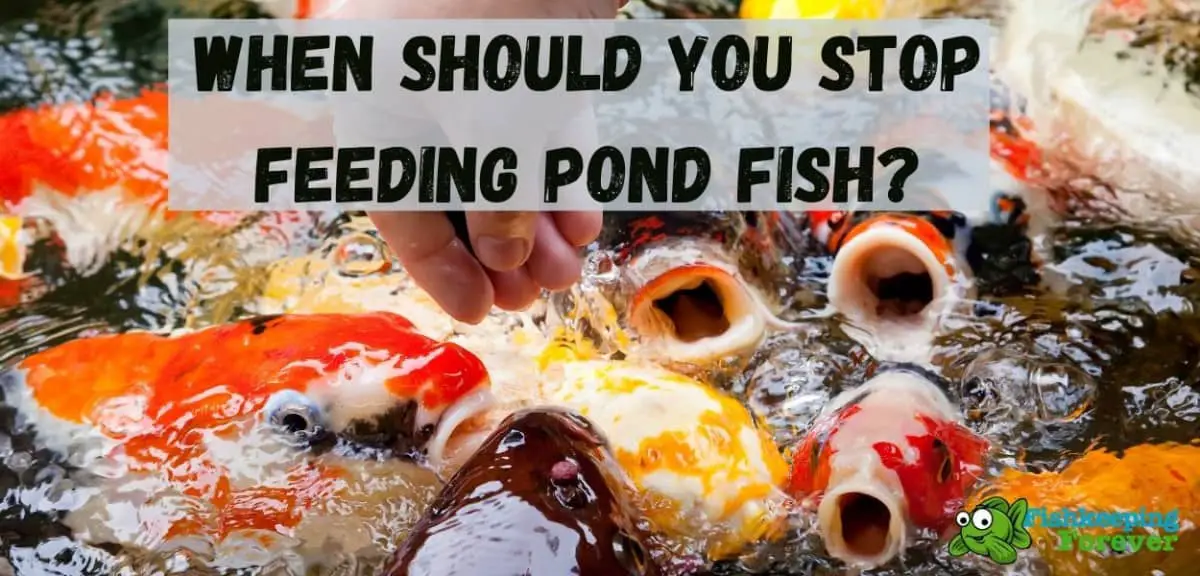The water temperature affects how much pond fish eat. While they can gather insects and larvae that live in the pond, you have the responsibility to ensure they feed properly. This brings us to the question, When should you stop feeding pond fish? Well, you should stop feeding koi or pond fish during winter when the water temperature is below 50 degrees Fahrenheit.
When should you stop feeding pond fish? During the cold season, when the water temperature is below 50 degrees Fahrenheit. Your fishes metabolism begins to slow down. Generally, low temperatures inhibit the ability of the fish to digest proteins. Therefore, you should feed your fish with wheat germ and spirulina to help them survive the winter period.
You can also buy a pond thermometer to help you know the right time to change the eating regimen.
Looking for a suitable winter food for your pond fish?
Table of Contents
Feeding koi fish through winter
The way you feed your pond fish will have an impact on their health. During winter, the fish are less hardy and vulnerable to diseases. But with a well-balanced diet, you can give them the much-needed protection. Pond fish love to eat anything they find in the water from insects to larvae. The diet can also include crabs and mollusks.
Once the cold temperatures arrive, you should start preparing your fish. If the water temperature lowers, you should mix your fishes’ food with a diet low in protein.
And to ensure the fish eats protein-free food, you may want to switch to wheat germ foods exclusively. Keep in mind that at 50 degrees F, the fish will eat less food compared to days with normal temperatures.
But does it mean that when you don’t feed the fish there’s nothing taken in? The fish will satiate their hunger on any algae in the pond. If they see irresistible pellet above their heads, they will still go for it.
Three food perfect for feeding Koi through winter:
Why you should stop feeding koi or pond fish in winter
Pond fish cannot digest food properly at low temperatures. This can make the food to decay in their system and eventually kill them. Besides that, the fish tend to reduce their activity level. When you stop to feed the fish, the pond will be cleaner and there will be less food waste.
Since the digestive system of koi fish is twice the length of their body, food digestion can take 2-3 days. And because cold water passes through the digestive system as they eat, this can result in digestive problems and diseases. Any overload will only clog the system. Finally, the fluctuating temperatures increase the stress level of fish.
Winter is considered a hibernation type of state so the fish will utilize the fat stored in their body. Even if there are some warmer days in winter, you should avoid feeding the fish.
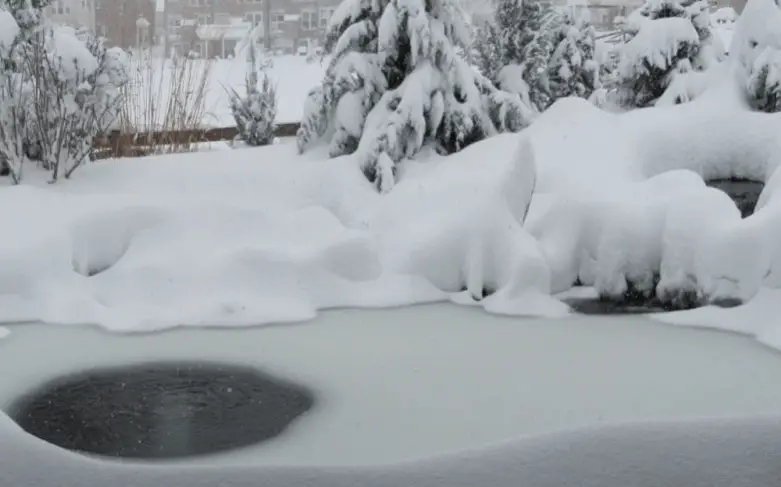
Should you stop feeding pond fish in fall?
During the fall, the water temperature begins to lower. The pond fish will start showing they are less interested in food. As the fish’s metabolism slows down, you should check the water temperature.
While koi fish can eat summer food in cold weather, they won’t be able to digest proteins. If you give them too much food, they can have a negative impact on water quality. As long as the temperatures are below 50 degrees F, you should transition the fish into cold water food.
Below this temperature, you can stop feeding the fish altogether. The best approach is to mix summer food with cold water food and then increase the portion gradually. Remember, after winter you’ll still have to get their appetite back.
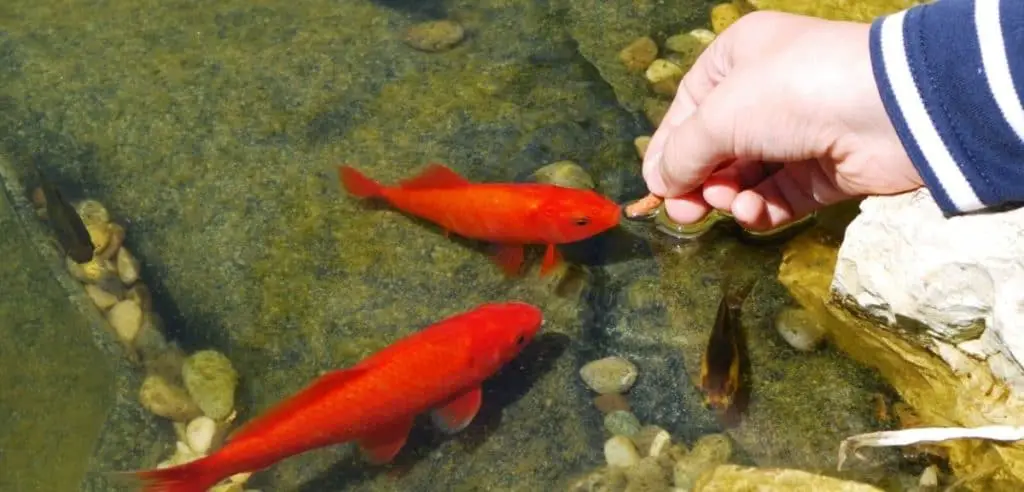
Should you start feeding the fish in spring?
During the spring season, you’ll notice a lot of fish feeding around your pond. But is it the right time to start feeding them again? Maybe they are giving you those hungry eyes as a tale-tell sign they are ready to resume their diet. While they may look like they are ready to eat, you should test the water temperature to ensure its above 50 degrees F.
The feeding should start with wheat germ food as it’s easier to digest and helps the fish become fully functional. Since the fish just came out of their dormancy, you should avoid overfeeding them.
To ensure there’s no too much organic material on the pond, you can feed the pond fish 2-3 times a week. The general rule of thumb is to feed them with foods they can consume within five minutes.
As the temperatures increase, you can increase the food gradually. However, if the fish continue to stay deep into the water, then that’s a sign they are not hungry. Therefore, you should adjust the rations and feeding time accordingly.
What is important is to ensure you feed the pond fish the right way. Avoid overfeeding them or wasting too much food. And because most commercial foods are concentrated, you should ensure the fish doesn’t eat too much as it can compromise the digestive system.
In summer, the fish can easily digest high protein food. It’s worth remembering that it takes time for the water temperature of the pond to rise even after a week of hot weather.
Time and frequency of feeding
The time and frequency of feeding will depend on the water temperature. With this in mind, you should feed the fish with low protein food 1-2 times a day.
Although you can give the fish with commercial dried insects, worms and spiders are also a good delicacy- just make sure they won’t bite the fish. Floating foods like flakes will also provide the fish with essential vitamins.
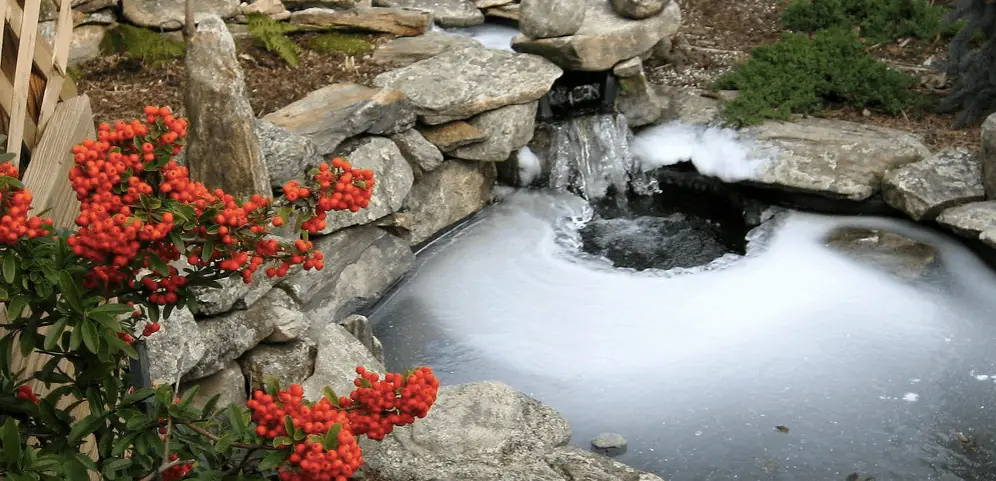
When the water temperature rises, you can feed the fish 2-4 times a day since the metabolism is high. In cold temperatures, you should avoid feeding the fish even if they beg for it.
The easiest way to tell whether the fish has had enough is to check the feeding habit. It’s worth mentioning that koi fish have large bellies so you should know how much they can handle without contaminating the water. After feeding the fish, make sure you remove the excess food from the water.
Final thoughts: When should you stop feeding pond fish?
Now you know when to stop feeding pond fish. As the seasons change, you should adjust the diet of your fish accordingly. When the temperatures hit 50 degrees F, they will go into hibernation mode but they will occasionally eat the algae in the ponds.
Be sure to keep a water thermometer at hand as it will help you know when to switch food or stop feeding the fish entirely. Don’t forget to keep an eye on forecasts if cold weather is due.
- How many eggs do Koi lay? How many and how often
- How long are Koi fish pregnant? Live Spawning or egg Layers
- Do Koi fish Eat Mosquito Larvae? Cool Facts!
- Can Goldfish eat worms? Garden or other types of worms!
- Can Goldfish eat Bloodworms? Are they safe to eat!
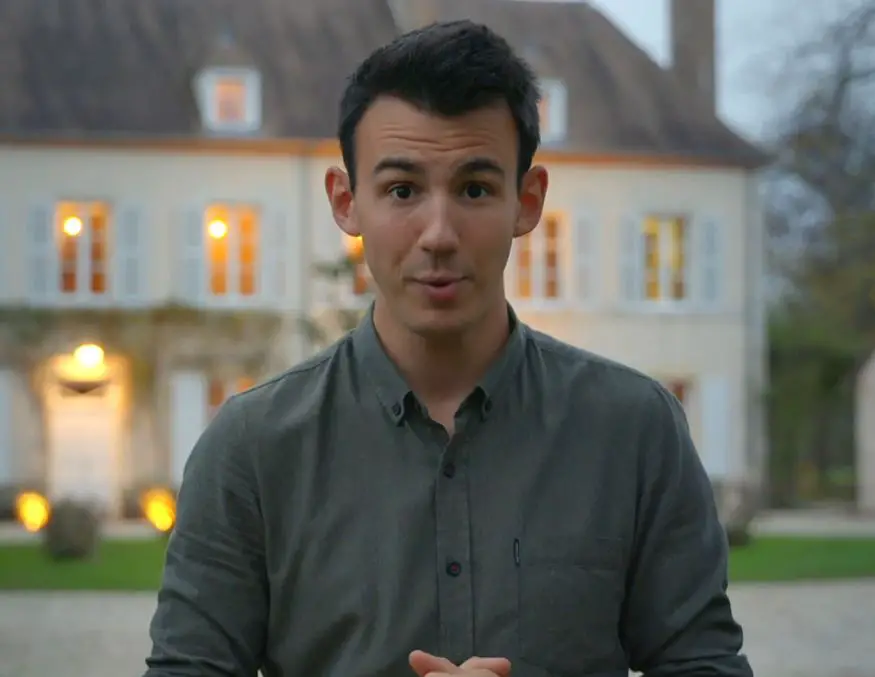
I have been working in the tropical fish industry for over 30 years now and I’m still learning. Everyday is a school day in this hobby. In my spare time I play golf very badly!


